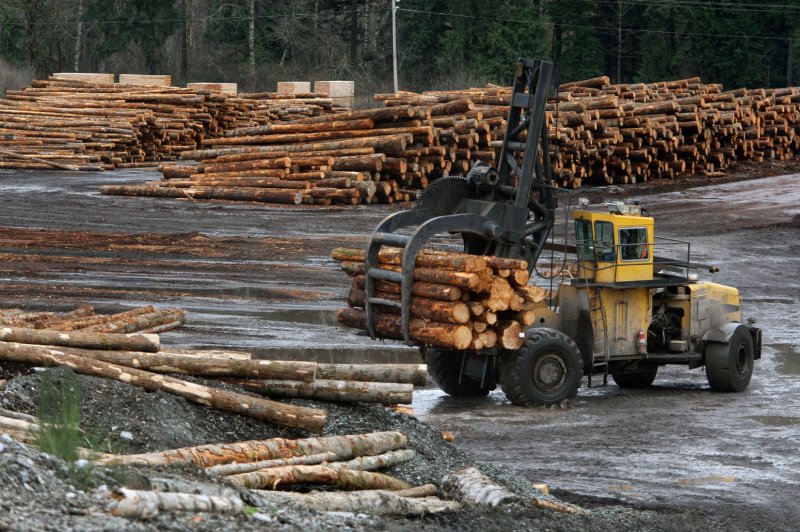Scientists warn that an increase in the use of wood biofuel in Europe could result in increased deforestation around the world. Photo by UPI/Jim Bryant |
License Photo
Sept. 12 (UPI) -- The European Union wants to double its use of renewable energy by 2030. To meet the target, the European Union's Renewable Energy Directive has designated wood as a low-carbon fuel source.
That's a bad idea, according to a new paper published this week in the journal Nature. According to researchers' calculations, an increase in the use of wood as fuel will boost greenhouse gas emissions and decimate forests.
It's true that wood regrows, scientists acknowledge, but in the short-term, large amounts of carbon will be released, as wood is burned for fuel and stumps left behind decompose.
Trees grow slowly. The burning of wood fuel will release carbon into the atmosphere almost immediately.
If Europe moves ahead with the directive, as currently conceived, scientists warn others are likely to follow suit. Indonesia and Brazil, home to the globe's largest, densest forests, have already announced plans to ramp up their use of wood biofuel.
"Globally, if the world were to supply only an additional 2 percent of its energy from wood, it would need to double commercial wood harvests around the world with harsh effects on forests," Tim Searchinger, author of the new paper and a researcher scholar at Princeton University's Woodrow Wilson School of Public and International Affairs, said in a news release.
Searchinger is one of hundreds of scientists who have have been pressing Europe's policymakers to change the directive's definitions.
"Placing an additional carbon load in the atmosphere for decades means permanent damage due to more rapid melting of permafrost and glaciers, and more packing of heat and acidity into the world's oceans," Searchinger and his colleagues wrote in an op-ed published in The Guardian last year.
For several years, the conversion of wood waste -- leftover pulps and scraps -- into biofuel has contributed to Europe's renewable energy. Reusing wood water leftover from other industrial processes is appropriate, scientists argue. Encouraging wood-based biofuel by classifying it as low-carbon or carbon neutral is different.
"Wood is a carbon-based fuel whose harvest and use are inefficient," researchers wrote in their new paper.
Due to these inefficiencies, the use of wood biofuels releases more carbon than coal per unit of energy. But an increased use of wood biofuel isn't likely to replace the use of coal. Scientists argue the directive's language is likely to privilege wood biofuel at the expense of truly carbon neutral energy sources like wind and solar.
The tradeoff could increase Europe's carbon emissions between 10 and 15 percent by 2050, according to the new research.
"Compared with the vast majority of what counts as 'bioenergy by harvesting wood,' solar and wind have large advantages in land use efficiency and lower costs. The focus on wood is not only counter-productive for climate change but unnecessary," said Dan Kammen, researcher at the University of California, Berkeley.















